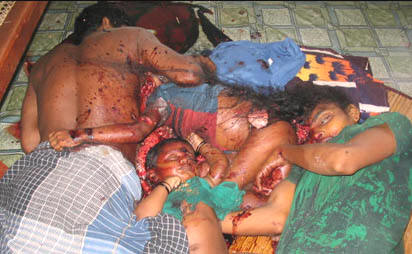 Sri
Lanka's military is now killing Tamil civilians with abandon.
Emboldened by the manifest reluctance of international
ceasefire monitors, leading members of the international
community and southern liberals to condemn their actions,
Sri Lanka's armed forces are abducting and killing people
with impunity. In the past two weeks alone, dozens of
civilians have been murdered by army and navy personnel who,
amongst numerous other attacks, abducted youth from a
temple, rocketed rickshaws carrying revellers to a birthday
party and, this weekend, rampaged through residential parts
of an islet off Jaffna. Meanwhile, people suspected of
supporting the Liberation Tigers are being abducted and
murdered or shot out of hand in the street. The matter of
extra-judicial killings was raised with reporters by
frustrated junior ceasefire monitors. "They [military] don't
even try to make things up," one said in disgust.
Sri
Lanka's military is now killing Tamil civilians with abandon.
Emboldened by the manifest reluctance of international
ceasefire monitors, leading members of the international
community and southern liberals to condemn their actions,
Sri Lanka's armed forces are abducting and killing people
with impunity. In the past two weeks alone, dozens of
civilians have been murdered by army and navy personnel who,
amongst numerous other attacks, abducted youth from a
temple, rocketed rickshaws carrying revellers to a birthday
party and, this weekend, rampaged through residential parts
of an islet off Jaffna. Meanwhile, people suspected of
supporting the Liberation Tigers are being abducted and
murdered or shot out of hand in the street. The matter of
extra-judicial killings was raised with reporters by
frustrated junior ceasefire monitors. "They [military] don't
even try to make things up," one said in disgust.
But the Sri Lanka Monitoring Mission (SLMM) is officially
silent on the wave of bloodletting unleashed by the military
amongst the Tamils of the Northeast. Indeed, the SLMM's new
head, Ulf Henricsson, has focussed his attention primarily
on censuring the LTTE. This newspaper warned recently that
the SLMM had set a dangerous precedent
by withdrawing, under Colombo's hostile pressure,
its accusation
that that "government security forces have, in the north and
the east, been involved in extrajudicial killings of
civilians." Regrettably, we were proven right within days.
Killings of civilians by the armed forces have escalated
sharply, particularly in Jaffna, but also in every other
district of the Northeast.
We also queried earlier, that if the international monitors
are prepared to retract their statements or abandon their
'convictions' simply because the Sri Lankan state expresses
its displeasure, then what purpose is served by the SLMM? To
monitor the LTTE alone? The answer, it seems, is yes.
Despite the widely reported, unabashed violence unleashed by
the armed forces against Tamil civilians, the SLMM seems
more preoccupied with Colombo's accusations against the
Tigers.
Matters have not been helped by the undisguised contempt Mr.
Henricsson demonstrated for the LTTE in his wide-ranging
comments to the press in the recent past. Mr. Henricsson's
job is to monitor breaches of the Ceasefire Agreement (CFA),
not pontificate on the character of the LTTE and its
leadership. Nor is it his brief to theorize on sovereignty
or to interpret international law. Those are matters,
surely, for the negotiators of both sides, if and when the
so-called 'core issues' are taken up for discussion. It is
Mr. Henricsson's brief, however, to investigate and condemn
the violence unleashed against our people by the armed
forces, amongst other breaches of the CFA. His failure,
indeed refusal, to do so has arguably contributed to
accelerating the cycle of violence.
The SLMM, however, is following the conduct of leading
international actors involved in Sri Lanka's 'peace
process'. Amid very real fears that Sri Lanka is slipping
back towards a major conflict, the international community,
resolutely refusing to look at the localized dynamics of the
'shadow war' (now, according to the SLMM a 'low-intensity
war') are focused primarily on pressuring one side, the
LTTE. The Tamils have repeatedly argued that the violence is
a cycle, whose continuation stems from the actions of both
sides. But rather than condemn and pressure the Sinhala
nationalist government of President Mahinda Rajapakse, the
international community is instead praising Colombo and
condemning the LTTE.
The wider framework of peace and political accommodation are
irrelevant to the Tamils now. Physical security is the only
concern. Thus it is the international community's continuing
reluctance to rein in the Sinhala leadership that is going
to precipitate a major confrontation.
Some Tamils suspect the international community is
allowing Colombo a space to terrorise the rebellious minority into
pressuring the Tigers to be more accommodative. Such logic ignores the
history of the conflict. Indeed, Tamil media report a sudden flood of
recruits to the Tigers, rather than a flurry of petitions.
In the meantime, the impassive, implacable attitude of the international
community is eroding Tamil faith in international commitment to their
wellbeing. The feeling that the callousness demonstrated during the 'war for
peace' of the late nineties still hold, has gained widespread credence. This
is also contributing to belligerence amidst the terror. The CFA has been
described as the bedrock of the Norwegian peace process. This is not only
because it promoted a sense of security between the protagonists and Sri
Lanka's peoples, but because it provided a secure space in which communal
harmony and amity could grow. Both are fast disintegrating.